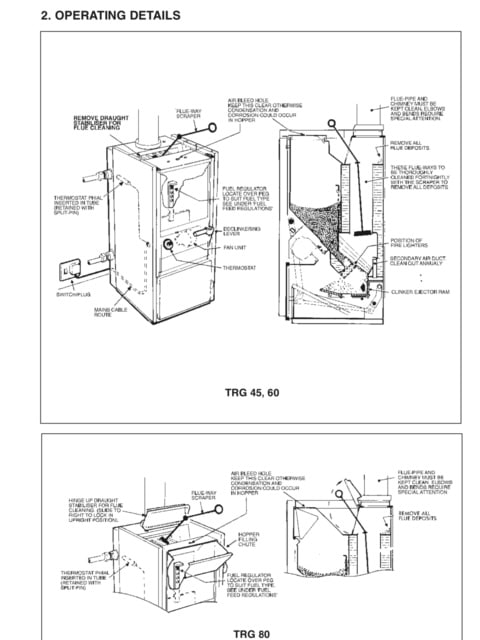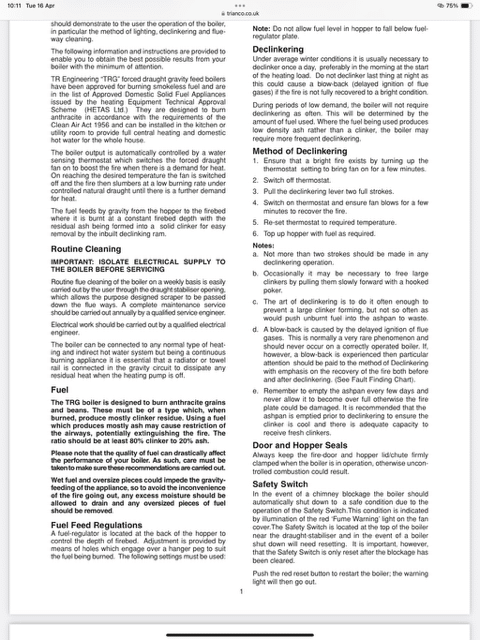No, it’s not a piece about seasonal colds and flu. Do you have any customers with a Trianco TRG boiler? Gavin Cater and Lawson Wight pool their experiences to help explain an issue.
Lawson said: Last November I was contacted by a long-standing customer (Ken) who was having problems with his solid fuel boiler. In case you are not familiar with them, the Trianco type of central heating boiler was quite common in rural areas and villages without mains gas. In the area I work there are not many left having mostly been replaced by oil or more recently heat pumps. They are relatively simple, gravity fed and straightforward to maintain. They run on natural smokeless anthracite grains / beans.
Ken explained that his boiler kept going out. Having used it for over 30 years, heíd never had problems and was struggling to understand what was going wrong. The boiler seemed fine and he felt it might be the fuel. It runs on anthracite grains and heíd recently had been a new delivery. The new fuel looked the same as usual, but the phone number of the quarry where it was produced was on the bag, so he called them.
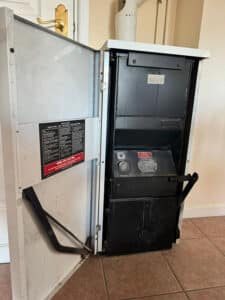
They were very helpful and explained that the ash and clinker produced would vary according to the particular drift being mined. There was no way to avoid this. In any event, there is only one source left in the country, so thereís no alternative.
I said I’d make some enquiries. One of the great things about being a sweep is the willingness of other sweeps to help with problems and nowhere has a stronger culture of co-operation than with the Guild members. Who to ask though? Only one name occurred to me, the Trianco King himself, Gavin Cater. One quick call and things became clearer. I got back to the Ken with the Gavin’s advice. Meantime he had taken further steps. Being of a very practical nature Ken had studied the instructions, cleaned the fan blades and adjusted the opening which allows more air through. He said this helped a lot.
I got back to Gavin later saying it may be useful for other members to be aware as the problem is likely to be universal and ongoing. So here’s the essential info.
Gavin says: I have used a Trianco gravity feed solid fuel boiler to heat my homes for all of my adult life, so it’s fair to say I know my way around one. But at the start of the heating season last year, I was struggling to keep the fire in overnight.
This is not something I’d had problems with before, the boilers would happily run 6 months without going out. I had also had a number of Guild members contact me saying their customers were experiencing problems with their boilers ‘going out’.
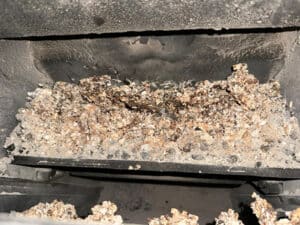
One obvious difference was the volume of ash being generated by the anthracite grains I was burning. During my time working in the coal business, we had anthracite from all over the world, with some of the very best being from Germany or China. Now, however there is no such choice and it’s very much a case of having whatever fuel you can get. My fuel is currently open cast (dug from a quarry, not a deep mine) in Wales.
In all my years using the Trianco’s I had never seen this much ash, I would normally empty the ash pan every 4 days but I was now having to empty it every other day. I realised that this was starving the fire of air during the night when the fire is just ticking over whilst the heating/hot water is not being used. After all we all know “No air = No Combustion”.
So, what to do about it? I have found that by running the boiler one number higher on the thermostat the internal fan in the boiler will cut in more frequently and this in turn will keep the fire in overnight.
My top tip is to de-clinker the boiler last thing at night, just before going to bed. That way the fire bed is clear of ash, therefore giving the fire the best chance of surviving the night time period when there is no demand for heat or hot water.
In summary, if your customers are experiencing trouble with their Trianco boiler this is the advice; Run the boiler one number higher than previously on the dial. Customers will worry that this will burn more fuel, but I haven’t noticed any increase in consumption. De-clinker last thing before going to bed and empty the ash more frequently.
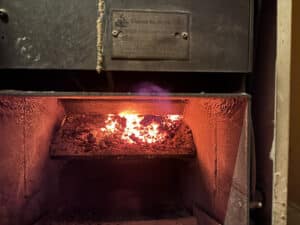
24/4/24. After publishing the above article in the Sweep Stuff magazine March ’24 we’ve received additional advice from expert member Keith Mitchell. Many thanks Keith.
In addition to Keith and Gavin’s comments, we have added some technical diagrams and information from the Trianco manual at the end of the additional information.
Keith Mitchel said: I have just read the article re. Trianco TRG boilers going out. Allow me to introduce the secondary air vent which is an oval tube above and at the rear of the burning grate. This is about the size of two pencils side by side. It allows a small amount of air to pass through the fire bed and into the flue system when the fan is off, keeping the fire bed alight.
If it gets blocked with fly ash, the fire goes out overnight when the fan is not running.
To access it you need to empty the hopper of fuel and remove the burning plate and de-clinkering ram. Look in the back and up with a torch and mirror and you will see it. Easily cleaned with a very small boiler tube brush or a piece of wire rattled around will do it. The tube is only about 6” long.
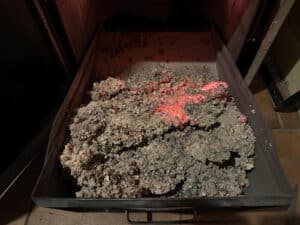
This should be checked every year when sweeping and servicing.
Gavin Cater added:
See diagrams below from the Trianco TRG Manual for the positioning of the air tube. They recommend this be cleaned annually when servicing the appliance. I’ve had conversations with members on this matter at the recent trade show and was pleased to hear that the article had helped them explain the problem to customers and how they could try to overcome it. You can see in the information from the manual regarding fuels below. It says the fuel should be “Anthracite Beans or Grains that Clinker”. This for me is the big issue. The anthracite that is available currently does not “clinker” and just produces fine ash, this then starves the fire of air.
25/4/24: Keith got in touch again to offer this further advice: The other common problem is overuse of the de-clinkering ram. It’s best to open the ash pan and look in at the fire bed as the handle is pulled down. You can then see the ash falling into the pan and when glowing embers appear, stop cranking the handle. Over cranking will dump the embers into the ash pan and the fire will go out
